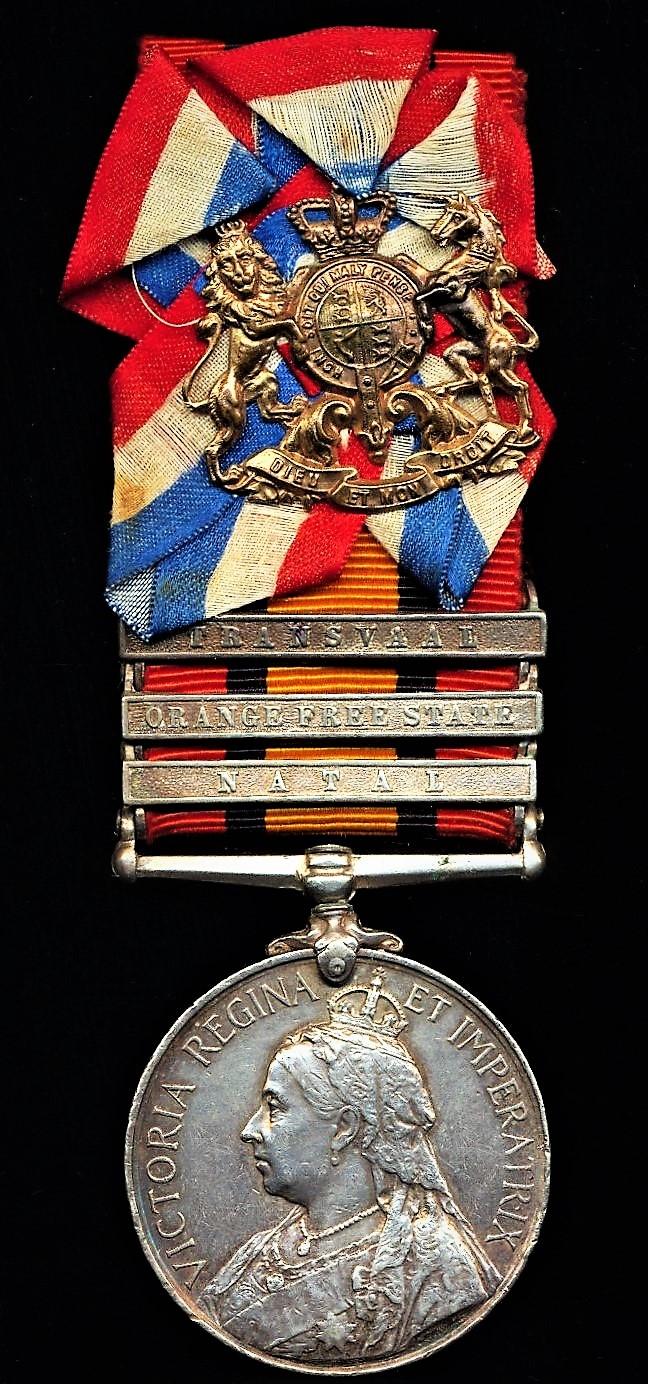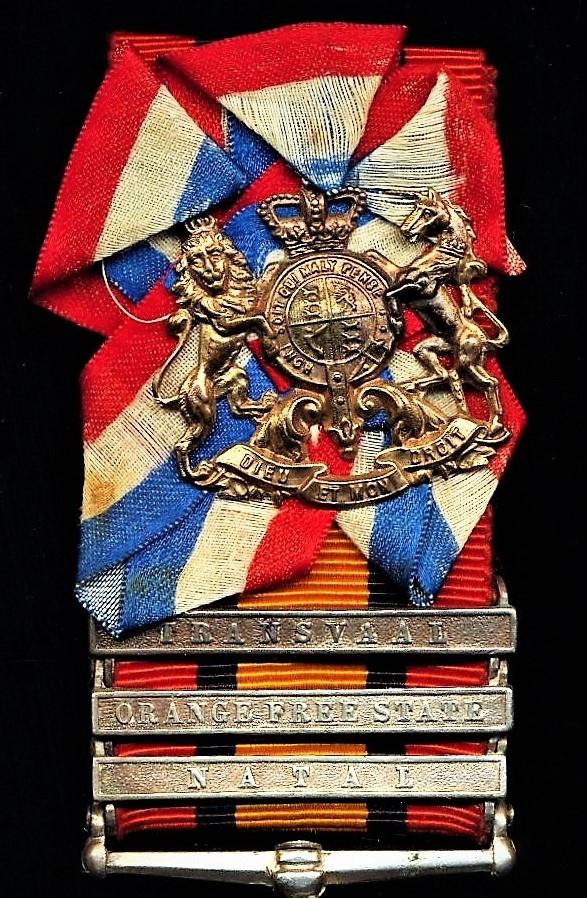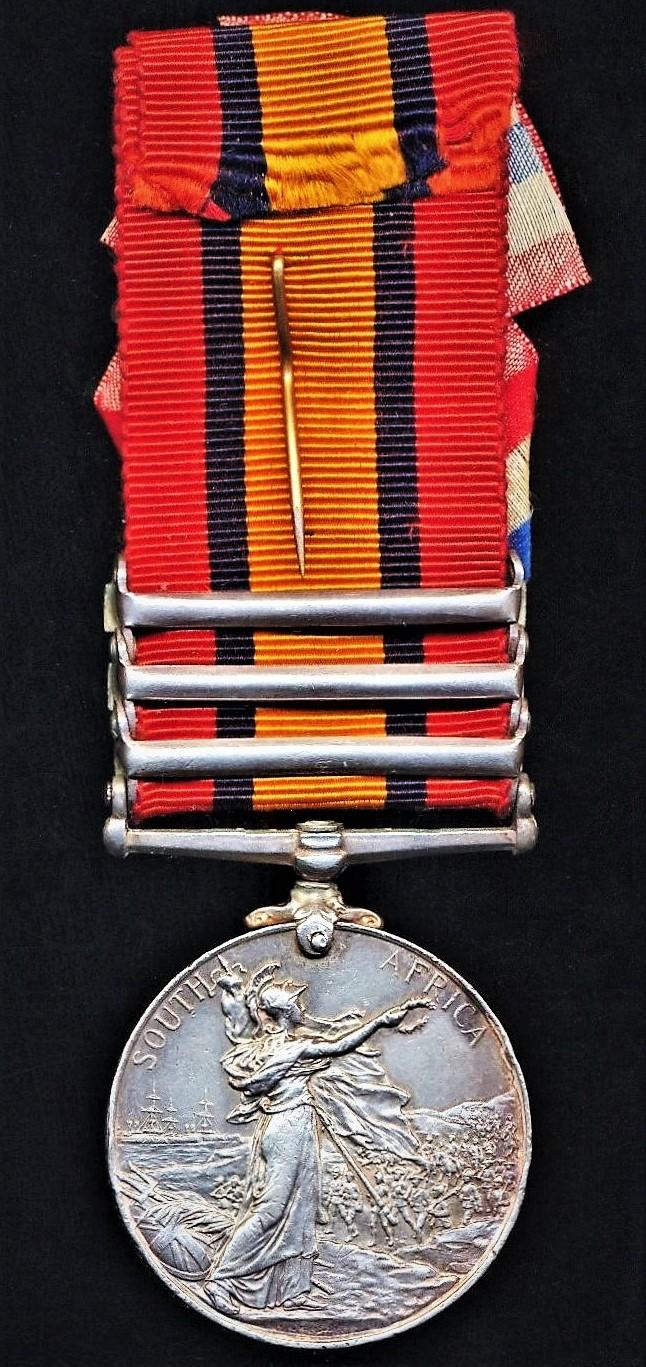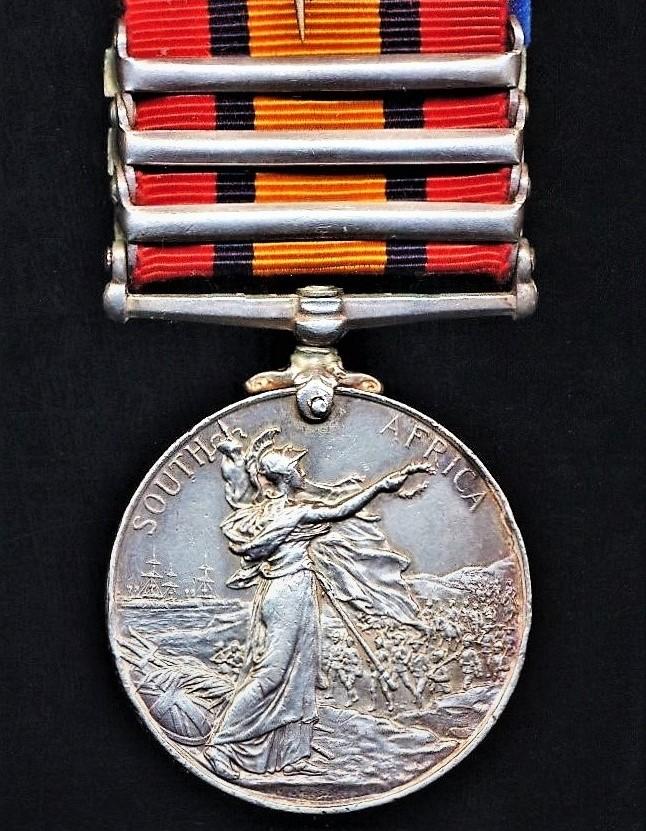Queens South Africa Medal. Silver issue & clasps 'Natal', 'Orange Free State', 'Transvaal' (6196 Pte J. Gallagher, Rl. Irish Fus:). With 'Patriotic' pin on riband
Missing-in-Action: Private Joseph Gallagher, 1st Battalion Royal Irish Fusiliers, attached '24th Mounted Infantry' is confirmed reported 'Missing-in-Action' after the Battle of 'Blood River Poort', fought on, 17 September 1901 (the South African Field Force Casualty List refers) - a crushing defeat by Louis Botha's Boer Commando against the 24th Mounted Infantry
24th Mounted Infantry: When the framework of fortified block-houses was developed in 1901 to protect British supply lines and dominate occupied Boer territory, the infantry manning them were quick to escape the monotony of static duties by volunteering for more mobile action with, for example, specially formed units of Mounted Infantry. 1/RIF provided a draft of men, including Joseph Gallagher to the 24th Mounted Infantry
On 17 September 1901, Major Hubert Gough's, 24th Mounted Infantry, which included officers and men of the 1st and 2nd Battalion The Royal Irish Fusiliers, was involved in a fierce fight against overwhelming odds on the border of Natal between Dundee and Vryheid at Blood River Poort. Gough, searching for a Boer group led by Botha, had observed some 300 dismounted Boers and moved with only part of his own force to engage them. As he did so, he was unaware that Botha was on his flank with the balance of his 1,000 strong force
Botha launched a mounted attack against Gough's outnumbered force killing, wounding or capturing half of the 24th Mounted Infantry. Gough's men gave a good account of themselves and his Adjutant was awarded the Victoria Cross for his actions in defending the field artillery. Among the wounded were Major Dick and Lieutenant Furnell of the 2nd Battalion The Royal Irish Fusiliers. Major Dick died several days later and was buried at Vryheid along with other members of the Regiment
British losses at Blood River Poort were one officer and 19 men killed, five officers and 19 men wounded, and six officers and 235 men taken prisoner, or missing. This was the most humiliating defeat suffered by the British since Nooitgedacht in December 1900
Medal and clasp verification: Medal and all 3 x clasps confirmed as entitled on the respective campaign medal roll of the 1st Battalion Royal Irish Fusiliers (ref WO 100/205) that was compiled and signed 'In-the-Field', Springfontien Orange River Colony, South Africa, on, 30 July 1901. In addition, the recipient is also confirmed entitled to the King's South Africa Medal with dated clasps (ref WO 100/345), which latter was compiled & signed at, Belfast, Ireland, on, 15 January 1903
The recipient Joseph Gallagher, an Ulsterman, was the son of John Cunningham, and a native of, Newry, County Down, Ireland, where he was born circa 1878. By trade a 'Miner', James claimed to be 19 years & 7 months of age, when he enlisted in the British Army, at. Glasgow, Scotland, on, 9 March 1897. Posted to the Royal Irish Fusiliers, James joined the Regimental Depot of the regiment at Armagh, on, 17 March 1897, and then was transferred to, 2nd Battalion Royal Irish Fusiliers, on, 26 March 1897. He was transferred to 1st Battalion Royal Irish Fusiliers on, 11 February 1899. James served overseas in Egypt, between, 14 February to 23 September 1899. James together with his battalion, were amongst the first British infantry regiments to be rushed to South Africa after the outbreak of the South African War. James served on active service in South Africa, 24 September 1899 to 22 April 1900, during which he was 'Wounded-in Action' at Farquhars Farm on, 30 October 1899. James took his final discharge from the British Army, on, 5 July 1900, due to being found to be medically unfit for further service. At time of discharge, his military conduct was described as having been 'Good'. He had served 3 years 119 days 'With the Colours'
Service papers for the recipient are extant and are held & accessible at The National Archives
Condition: About VF
Code: 21995







